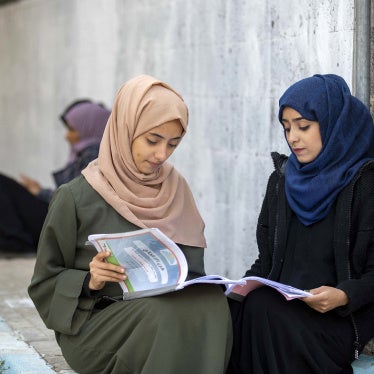Women’s rights activists in Tunisia have scored some major successes since the Jasmine Revolution that ousted President Ben Ali in January 2011.
Just a few months later, in April 2011, Tunisia’s electoral commission adopted a gender parity law that requires each party to run an equal number of male and female candidates in the upcoming Constituent Assembly elections, slated for October 23.The assembly will have the critically important task of re-writing Tunisia’s next constitution.
The increased representation of women is not a guarantee that a new constitution will protect women’s rights and advance gender equality. But on the surface the gender parity law recognizes the importance of fair representation in politics and in the decision-making processes that will help shape Tunisia’s future.
If the new constitution effectively guarantees women’s rights, it will give added impetus to women’s activists to work towards ensuring that future laws do not discriminate between men and women. Article 6 of Tunisia’s current constitution guarantees equality between all its citizens, but does not specify gender equality.
In another achievement that has not been widely reported, Tunisia’s Council of Ministers voted on August 16 to lift all key reservations to the Convention on the Elimination of All Forms of Discrimination against Women (CEDAW), the international treaty to foster equality between men and women.This remarkable move lifted Tunisia’s reservations to giving women equal rights to nationality, and to equality within the family in matters of marriage, divorce, and custody.
Tunisia has long had the most progressive personal status code in the region, prohibiting polygamy and giving women equal rights with regard to marriage and divorce. And now it has become the first Arab country to withdraw its main reservations to CEDAW. The convention prohibits gender discrimination in all spheres, including education and health, and defines a national action plan for governments to end all forms of discrimination against women.
Tunisian women’s rights activists have called for the withdrawal of reservations to the women’s rights treaty since at least 2005 and activists across the Middle East and North Africa are making similar efforts.
However, despite this step forward, Tunisia has kept a general declaration to the convention, which states that it will not enact any laws or take any steps to contradict article 1 of Tunisia’s Constitution, which establishes Islam as the state religion. The Tunisian authorities should also withdraw this declaration: no state should use its constitution to justify failing to comply with international legal standards.
Some Tunisians are concerned by the emergence of conservative religious parties that may oppose more rights for women and may advocate the rollback of gains already made. It’s vital that the government stands firm on the progress already achieved for women in Tunisia.
But for now the Tunisian activists who fought for equality have much to celebrate: the ousting of a dictator and the emergence of democracy, as well as important gains for women.Other countries in the region should learn from Tunisia and put equality for men and women at the top of the reform agenda.








